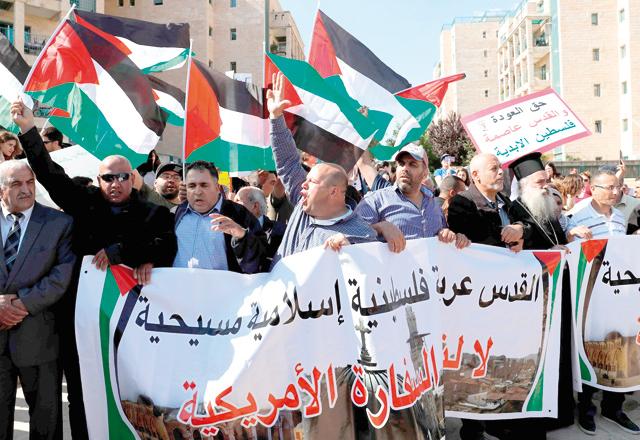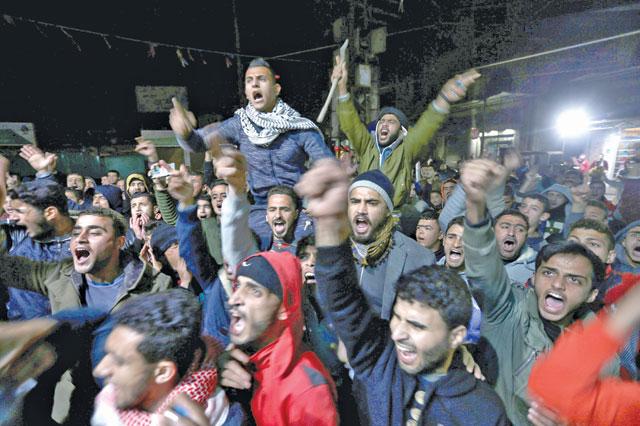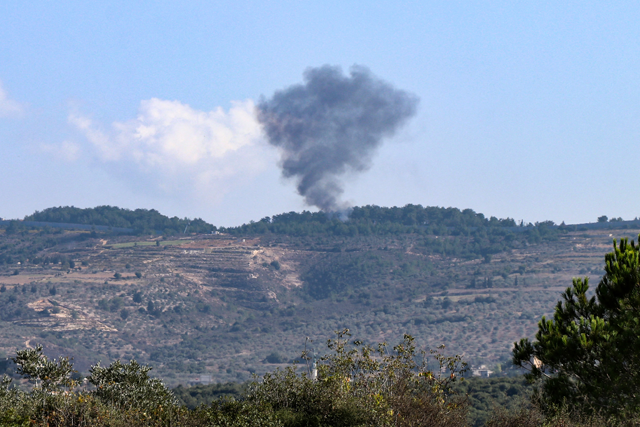You are here
Fury, resignation, silence in region as US opens Jerusalem embassy
By Reuters - May 15,2018 - Last updated at May 15,2018

Arab demonstrators protest in front of the new United States embassy in occupied Jerusalem on Monday. The banner reads in Arabic ‘Jerusalem is Arab, Palestinian, Muslim, Christian’ (AFP photo)
RIYADH/BEIRUT — The opening of the US embassy in occupied Jerusalem as Israeli forces shot dead dozens of Palestinian protesters in Gaza on Monday sparked outrage in much of the Middle East — but virtual silence among Washington's closest Gulf allies.
In recent years the bitter regional rivalry that pits Shiite Iran and its allies against a bloc led by Sunni Muslim Saudi Arabia has increasingly pushed the decades-old Arab-Israeli struggle into the background.
While Saudi Arabia and its fellow monarchies have previously criticised the embassy decision, they have also welcomed US President Donald Trump's harderline against Iran, which has cast itself as the guardian of Palestinian rights.
Among many ordinary people in the region, however, there was fury, dismay and bitter resignation at the news that Israeli gunfire had killed at least 43 Palestinians, the highest toll in a single day since protests demanding the right to return to ancestral homes in Israel began on March 30.
"We are against the embassy move because this is our country. They haven't left us with anything," said Zeinab, a woman in the Palestinian refugee camp of Burj Al Barajneh in Lebanon.
"As an Egyptian and an Arab, I feel humiliated," said Sami Badreddin, 40, a state company employee in Cairo, whose country made peace with Israel in 1978. "They transfer the US embassy to Jerusalem while all the Arabs are silent."
"Trump hates Muslims and he is showing it every day," said Salim Hamlaoui, a student at Algiers University.
The United Nations says the status of Jerusalem — captured by Israel in the 1967 June war — can only be resolved by negotiations. Palestinians want the city as their own capital.
The timing of the embassy's move to occupied Jerusalem from Tel Aviv on the 70th anniversary of the creation of Israel, a day Palestinians regard as their "Nakba" or "catastrophe", when they lost their homeland, added insult to injury.
In recent weeks, Israeli forces have shot dead scores of Palestinians in Gaza protesting at the border over the fate of refugees who fled their homes during partition in 1948, including dozens on Monday.
The embassy move encouraged the "massacre carried out by Israeli security forces", said Turkey's foreign ministry.
Friends and foes
US allies warned the United States it would damage its regional standing after siding with Israel on a fundamental position without a final peace agreement.
President Recep Tayyip Erdogan of Turkey, whose ties with its NATO ally have grown increasingly fractious, described the move as "igniting a fire".
"The United States has chosen to be a part of the problem rather than the solution with its latest step and has lost its mediating role in the peace process," he said in London.
Lebanon's Western-backed Prime Minister Saad Al Hariri said the move spelt a "dead-end" for all paths to regional peace.
In Jordan, which made peace with Israel in 1993 through a US-mediated peace process, protesters near the heavily-defended US embassy in Amman chanted: "America is the head of the snake. No US embassy on Jordanian soil."
Egypt, the most populous Arab country and longtime mediator in the peace process, avoided direct criticism of its US ally.
But state-run Egyptian newspaper Al Ahram said in an editorial that the US move was "provocative" and "a dangerous episode in a series that is about to destroy any hope for achieving peace".
Washington's foes were predictably scathing.
Iran's parliament speaker Ali Larijani described Trump's international policy as "half-baked".
"The leaders of America and the Zionist regime must understand the message of the protests that violating Palestine and the moving of the capital will not go unanswered," he added.
In Iraq, Shiite cleric Moqtada Al Sadr, a nationalist and long-time adversary of the United States, who was leading in parliamentary elections with more than half the votes counted on Monday, Tweeted: "I hope the divine response will come."
Hizbollah, a Lebanese Shiite group backed by Iran and seen by the United States as a terrorist group and by Israel as the biggest threat on its border, called the embassy move a "worthless" unilateral step.
Saudi Prince Turki Al Faisal, a former intelligence chief who no longer has a formal role, said on television: "America has stood for the rule of law, for justice, for respect of international agreements... and now we see all of that being pushed aside for the sake of internal political calculations."
He said the move would benefit their shared foe Iran, allowing it "to capitalise on this issue".
In the southern Yemeni city of Aden, where Gulf States have become embroiled in Yemen's civil war, Rashad Mohamed, a 55-year-old government employee, said the embassy move "has done a service to extremist groups and Iran".
A Saudi foreign ministry statement criticised Israel's violence against protesters and affirmed its support for Palestinian rights but did not mention the embassy move.
"We look at our shattered world where we accuse each other of betrayal and of abandoning Palestine, while the truth is we have all abandoned it," Tweeted Jamal Khashoggi, a former Saudi newspaper editor.
Related Articles
CAIRO/AMMAN/BEIRUT — Arabs denounced President Donald Trump's plan to move the US embassy in Israel to Jerusalem as a slap in the face, but
OCCUPIED JERUSALEM — A 17-year-old Palestinian stabbed an Israeli-American right-wing activist, a settler, near the entrance to a mall in th
OCCUPIED JERUSALEM — The Israeli military and powerful Lebanese movement Hizbollah engaged in cross-border clashes on Saturday, with both cl



















